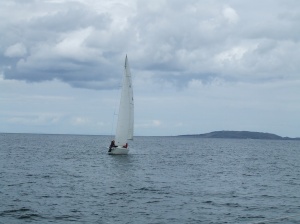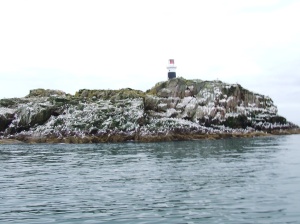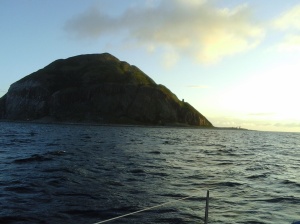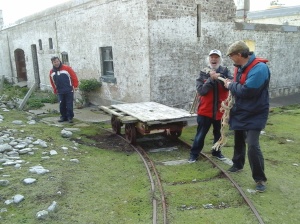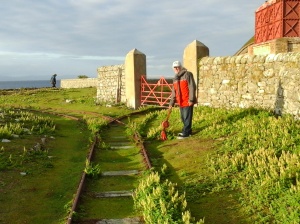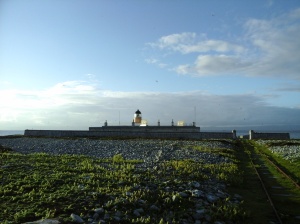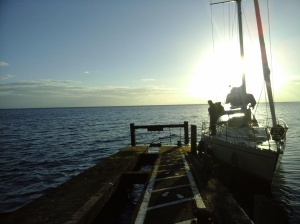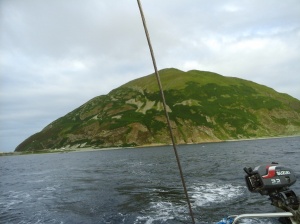Ailsa Craig Granite
When we were boys we collected birds’ eggs. It’s illegal now, as I understand. It’s even illegal to possess them, without some sort of permit. My criminal past is all behind me. The evidence has been destroyed by time, by swaps, malevolent rivals, faulty cardboard boxes crushed under junk and a gradual feeling that the eggs were probably better off if left in the nests to hatch. ‘Nest’ would be overstating things with regard to most sea birds. The birds rely on camouflage. The eggs may be in a depression scraped in the beach or under the lee of a rock. In some cases the eggs are laid on vertiginous rocky ledges and shaped in such a way as to prevent them rolling off. Like Mr. Wobbly Man, the weight is at one end.
There are wonderful maps on Lambay Island showing the nesting grounds of the various birds and the times at which they laid. This was to facilitate commercial exploitation of a valuable source of protein, until the advent of large-scale poultry farming. How do you like your eggs in the morning? Preferably with no little feathery scaldy inside.
The luminous midsummer night gave way to a bleak and blustery dawn. The wind picked up and Ailsa Craig peeped above the horizon. A pyramid rising from the sea; a hanging garden viewed from afar; ‘Paddy’s Milestone,’ a landmark for homesick labourers leaving Ireland to earn a few pounds in the potato fields of Scotland. It’s the plug of an ancient volcano from the time when Scotland’s Highlands tore away from the Appalachians and the Atlantic Ocean swelled up to fill the void. It took some time. It is still happening. ‘Preposterous time’ William Goldsmith calls it, a length of time too vast for our puny minds to comprehend. Time enough for living things to evolve, to swim in the oceans and rivers, to creep upon the Earth and take to the air on flimsy wings, colonising islands and cliffs and laying their eggs in relative safety.
The sun emerged. The rock took on some colour. It crept closer. We could see the white of gannet colonies on the slopes. The Solan Goose. A delicacy. Robby Burns’s father was said to be in the solan goose trade. I would never have dared, had it been possible, to try to collect a gannet’s egg. It has angry eyes. It is armed with a fearsome weapon. It takes no prisoners. Someone suggested a dip off the jetty. The early morning cold and a vast brown jellyfish, knocked that idea on the head. The chef prepared porridge with honey, to put some volcanic warmth into his torpid crew. It worked. We went ashore. That’s probably illegal, to judge by all the cautionary notices. The island is for sale for a paltry £1,500,000. Would the Marquess of Ailsa take a cheque? I doubt it. The birds live rent free on what is, and always has been, their territory. It is now officially a bird sanctuary. There goes the egg and solan goose trade. The smugglers gave up centuries ago and migrated to Rush, in County Dublin. The granite quarry is abandoned. The railway could still run if enough muscle power could be made available. (That was powerful porridge.)
Modernity has rendered all the industry of Ailsa Craig obsolete. There are living quarters abandoned while still undergoing renovation. There is no need for coal or oil. Engine rooms are filled with rusty metal. The fog horns have fallen silent, their windpipes and lungs decayed and shattered. Modern navigational devices, guided from space, can see through fog and darkness. There is a Marie Celeste air about everything: old newspapers and books musty with damp; broken windows; lath-and -plaster hanging from walls and ceilings; tattered and battered furniture; roof-trees giving way under the weight of time and neglect. Only the lighthouse, automated, with pristine solar panels, abides. There is no shortage of stones.
The Scots invented the sport of curling, just as they invented golf. Golf has taken over the world. It has become a vast industry, while curling remains a minority sport, an amalgam of bowls and housework. For golf you need an array of specialised equipment. For curling you need some ice, a polished stone and an accomplice with a sweeping brush. It has become an Olympic sport. It has a mesmeric, balletic quality about it. Even the sweeping becomes dramatic. The best stones come from Ailsa Craig. The granite, blue-hone granite, is fine-grained and takes a high polish. A curling stone is a piece of sculpture in its own right. Intriguingly, Ailsa Craig granite crops up on the North Strand in Skerries, several hundred miles to the south, carried by the gyre of the Irish Sea tides. The stones are polished almost as smooth as the curling stones by their long and grinding journey. They lie, speckled like birds’ eggs on the shelving strand, where Vikings once grounded their keels.
When the keel begins to converse with the stones on the bottom, it is time to leave. Time to pack up memories and impressions of this melancholy but beautiful place and hand it back to the stewardship of rabbits and teeming flocks of seabirds. We headed northwards to Troon and the teeming hordes of golf pilgrims. I took a little pebble with me; probably illegal. It’s about three billion years old, give or take a few million. I like old things.
I left plenty behind.

